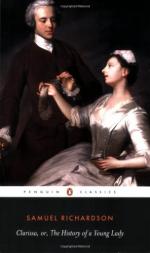All this in so composed and cheerful a manner, that we were equally surprised and affected with it.
You can witness for me, Mrs. Smith, and so can you, Mrs. Lovick, proceeded she, if any one ask after my life and conversation, since you have known me, that I have been very orderly; have kept good hours; and never have lain out of your house but when I was in prison; and then you know I could not help it.
O, Lovelace! that thou hadst heard her or seen her, unknown to herself, on this occasion!—Not one of us could speak a word.
I shall leave the world in perfect charity, proceeded she. And turning towards the women, don’t be so much concerned for me, my good friends. This is all but needful preparation; and I shall be very happy.
Then again rubbing her eyes, which she said were misty, and looked more intently round upon each, particularly on me—God bless you all! said she; how kindly are you concerned for me!—Who says I am friendless? Who says I am abandoned, and among strangers?—Good Mr. Belford, don’t be so generously humane!—Indeed [putting her handkerchief to her charming eyes,] you will make me less happy, than I am sure you wish me to be.
While we were thus solemnly engaged, a servant came with a letter from her cousin Morden:—Then, said she, he is not come himself!
She broke it open; but every line, she said, appeared two to her: so that, being unable to read it herself, she desired I would read it to her. I did so; and wished it were more consolatory to her: but she was all patient attention: tears, however, often trickling down her cheeks. By the date, it was written yesterday; and this is the substance of it.
He tells her, ’That the Thursday before he had procured a general meeting of her principal relations, at her father’s; though not without difficulty, her haughty brother opposing it, and, when met, rendering all his endeavours to reconcile them to her ineffectual. He censures him, as the most ungovernable young man he ever knew: some great sickness, he says, some heavy misfortune, is wanted to bring him to a knowledge of himself, and of what is due from him to others; and he wishes that he were not her brother, and his cousin. Nor doe he spare her father and uncles for being so implicitly led by him.’
He tells her, ’That he parted with them all in high displeasure, and thought never more to darken any of their doors: that he declared as much to her two uncles, who came to him on Saturday, to try to accommodate with him; and who found him preparing to go to London to attend her; and that, notwithstanding their pressing entreaties, he determined so to do, and not to go with them to Harlowe-place, or to either of their own houses; and accordingly dismissed them with such an answer.
‘But that her noble letter,’ as he calls it, of Aug. 31,* ’being brought him about an hour after their departure, he thought it might affect them as much as it did him; and give them the exalted opinion of her virtue which was so well deserved; he therefore turned his horse’s head back to her uncle Antony’s, instead of forwards toward London.




